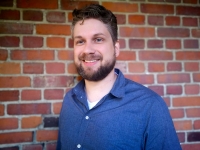Background
- MS in sociology at the University of Oslo in 2013.
- Employed as a project coordinator in the “From Addiction to Employment” project at RusForsk in 2019.
- Five years’ experience as a job counselor and course leader in vocational training.
- Experience within journalism and communications.
Academic interests
- Vocational rehebilitation
- Substance use and addiction
- Treatment method reseach
Title: An evidence-based method in a new context: An investigation of the relevance of work and the perceptions and feasibility of Individual Placement and Support (IPS) for patients with substance use disorders.
My PhD-project is about assessing the feasibility of the employment support method Individual Placement and Support (IPS) on people with substance use and addiction disorders (SUD).
Hooked on work
Patients with substance use and addiction disorders (SUD) are largely unemployed. At the same time, work represents a number of health-promoting conditions, such as social integration, a drug-free network, structure in everyday life, meaningful activity, belonging and the development of abilities and skills. Employment is also associated with better outcome of substance use treatment, and employment protects against relapse after treatment completion. Yet, approximately 90% of people in SUD treatment are unemployed, and measures to help people with SUDs attain employment are wanted by both the government, user organizations and the patients themselves. Unfortunately, evidence-based vocational methods are lacking in the substance use treatment field, but knowledge can be drawn from adjacent health disciplines.
Individual Placement and Support (IPS) is an evidence-based method designed to help persons with severe mental disorders (SMI) obtain and keep competitive employment. IPS has been proven effective across a variety of settings and economic conditions, and is more than twice as likely to lead to competitive employment as traditional vocational rehabilitation methods. The method is based on eight principles, including focus on competitive work, integration of vocational and clinical services in the same team, and rapid job search. The content of the IPS service is clearly defined and highly structured. A 25-item fidelity scale is used to evaluate the quality of the service, with cut-offs for accepted, high and very high quality.
This PhD-project is part of the research project Hooked on Work, which is a large multi-study project initiated by the section for clinical addiction research (RusForsk) at Oslo University Hospital (OUS). The main aim of Hooked on Work is to investigate the effect and feasibility of IPS for people with SUDs. The project consists of a randomized controlled trial (RCT) which is carried out in the Department for Substance use and Addiction Treatment at OUS, a quantitative observational study in collaboration with the Tyrilistiftelsen, Oslo kommunale ruspoliklinikk and Haugenstua ressurssenter, and a qualitative study.
There is a high level of comorbidity between the patient groups with SMIs and SUDs, but there are also many things that set them apart. This PhD-project examines whether you can use methodology developed for one patient group, and apply it on another without any significant changes, or do we need to make methodological adjustments to better suit the SUD patient group?
I will primarily work on the qualitative study of the Hooked on Work project, but the PhD will also include a quantitative comparison study where baseline data from Hooked on Work RCT will be compared with similar data from patients with SMIs who receive IPS.
The research questions of the qualitative study are as follows:
- What are perceived barriers and enabling factors in obtaining competitive employment for persons with substance use disorders?
- How do actors involved in the SUD-IPS process experience working with and receiving the SUD-IPS?
- Do the IPS method need adjustments to better suit the needs of the SUD patient group?
The research question of the quantitative comparison study is:
- What are key characteristics that differentiate SUD patients seeking IPS employment support from SMI patients seeking IPS employment support?
Supervisors:
Main supervisor: Eline Borger Rognli (PhD) – researcher at RusForsk, OUS.
Co-supervisor: Professor Silje Endresen Reme - associate professor at the Institute of Psychology, UIO.
Co-supervisor: Dr. Ingrid Amalia Havnes (MD-PhD) – researcher at the National Centre of Competence for Addiction Treatment, OUH.
Funding:
The PhD project is fully funded for the whole period by the South-Eastern Norway Regional Health Authority.
